
How to Prepare for a Major Table Tennis Tournament?
Participating in major table tennis tournaments is always a daunting and turbulent experience for all table tennis players, regardless of their tournament exposure, experiences, and skill level. For one, competing and playing against an opponent in a massive audience and unfamiliar setting can be very stressful, especially if the audience is rooting for the opposing side. Secondly, there is also this tendency for table tennis players, which I do believe also happens to any other sports enthusiasts engaging in tournaments, to reckon and ideate supposed embarrassing moments in front of everybody else. This usually causes the feeding of negativity within the players that usually is also the cause of detriment of the players’ performance.
Having the said premise, it is, first and foremost, essential to know how you can maintain your composure during the tournament days proper. We can dwell on the more technical and practical matters later.
External factors such as knowing how good your opponents are, how important the tournament is, how big the audience number is, can all be stress and anxiety inducers during the tournament. But what is more important to know is that they are not the causes; they are merely sources. Nervousness and self-anxiety is always caused by our inner response to the external factors. This means that you yourself is the one responsible for all the stress. And this also means that you have the capability to change it yourself. But, how so?
Here are a few tips to maintain your composure under stressful circumstances in the tournament:
-
Focus at the present moment
Allowing your mind to wander about how the future will unfold, or drift back to the past, will only increase your nervousness. You have to master the art of focusing in the present if you want to stay composed during your games. Learn also to recognize instances when you lose your train of focus and become indulged with the instinctive drift of thinking about the future or past again, and just try to focus back.
-
Focus on yourself
Do not allow your focus to drift to anyone or anything else apart from your playing style and strategies, especially about expectancies of your teammates, coaches, audience assumptions, for doing so would, again, make you feel more stressed and nervous.
-
Set goals aside during the game
While it is good to have goals set, focusing on these outcome goals during game time will only pressure you more. Leave them at home.
Now that you know how to combat the number 1 potential toxic of your performance in tournaments, we can further discuss about the things to expect, to remember, to do, and not to do during the table tennis tournament proper itself.
A couple of days prior to the tournament:
-
It would be a good idea to ease up your accustomed training routine, especially if you practice a lot of physical exercises. This is to not wear yourself out too much and allow your body to rest. Of course, you would want to present yourself fresh, so toning down and keeping your training light within this timeframe is necessary.
-
On the flipside, you would want to be accustomed to your lifestyle apart from training as much as possible. Stick to your routinely errands. Do not make any radical changes in your diet plan, do not change your sleeping patterns, do not intake too much alcohol (or utterly refrain, at least for a few days before the tournament). And as much as possible, avoid changing your table tennis equipment- you know how long equipment mastery takes. It is also not ideal to try to learn new table tennis strokes and techniques a few days prior to the tournament.
-
Keep in mind the necessary tournament details. If you are unfamiliar with the tournament venue and location, use GPS and associate it with familiar landmarks nearby so you can easily remember it when you go back during the succeeding days. Be certain of the game schedules, you don’t want to be rushing into your games unprepared and disorganized.
-
Pack your table tennis equipment and gears the night before. Do a double check on the day itself. The last thing you would want to be worrying about on the tournament day is your gears. To be more specific, ensure that your table tennis rubbers are compactly glued to your blade, and that the shoes and apparel you would be wearing won’t bother and make you feel uncomfortable. And also, get all the other things ready- water bottle, extra practice and gaming shirts, towels, table tennis balls, and glue.
-
Get plenty of sleep and rest. Fuels necessary to prompt you up during the tournament proper include rest, hydration and healthy food.
Tournament day, before your respective match:
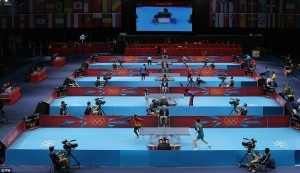
-
Be punctual; allot a time allowance for you before the tournament actually begins. Set aside time to exercise your warm-up routines. Check if there are any tables intended for warm-up. If you don’t have a warm-up partner, do not be afraid to ask other players to warm-up with you.
-
Prepare for slippery floorings. Tournament arrangements sometimes fail to inspect if the tournament venue’s floor is suitable for the gum sole technology most table tennis shoes have. Playing level is also critical about floorings because without proper floor texture, it is hard to do the proper table tennis footwork techniques.
-
As much as possible, refrain from warming-up on tables with tournament games ongoing nearby. This is to any avoid unnecessary distractions such as the ball flying to the tournament court, extraneous diverting noises to dispense the focus of both parties engaging in the game’s in progress. And of course, nobody wants his/her table tennis ball interrupting an intense and hyped up match.
-
Pack a reasonable amount of healthy food, as it is not a guarantee that you will be able to find a substantial quality food during the tournament.
Tournament day, during your match:
-
Warm-ups are conducted in short spans during the game, so be sure that you cooperate with your opponent to maximize the given warm-up time.
-
Be informed of the proper table tennis etiquettes in tournaments:
-
When your shot hits the net or edge of the table, a simple acknowledgement would be proper. This also applies to lucky shots and unintended unorthodox shots.
-
While battle-cries could be of great help when it comes to your motivation and hype during the game, excessive repetition of it will be a nuisance to both your opponent (counter-intuitively positive) and to the surrounding games. Try to display genuine sportsmanship and a decorous conduct.
-
In instances of close calls, keep in mind that the umpires still reserve the right to state the last call.
-
Let the match intensity determine your celebrations. It is not much of a pleasant sight seeing a fairly better player overly celebrating a table tennis match win against a beginner.
-
Do not forget to shake hands with your opponent, the umpire, and referee.
-
As aforementioned above, attempt not to lose your train of focus during your table tennis games.
-
While not necessary, it is recommended that you bring camcorders to personally see for yourself areas of improvement, may it be in your strokes, ball placing and pacing, footwork movement, etc.
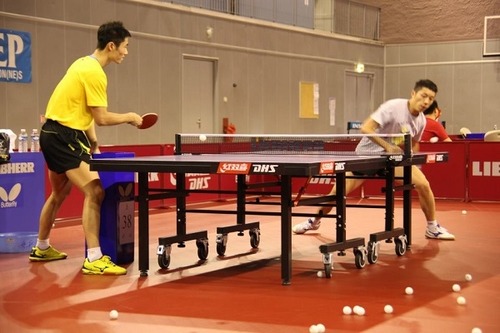
Preparations for major table tennis tournaments become handy with mental and practical substances, but it is never complete without the technical stuffs.
The most obvious aspect to dwell on before participating in a table tennis tournament, regardless whether it is a major one or not, is training. Apparently, to be able to play at a competitive level demands strict and formal training sessions. You have to ensure that you have had a well-balanced training comprising of hitting quality shots against different styles of players, considerable amount of physical training, and service practices. If your training partner is varied, you will eventually adapt faster to any styles of play.
Next comes strategy. Devising a strategic and tactical plan to outlast your opponents, especially against opponents with relatively the same level as you are, is essential to winning.
The prime action to take is observing your opponent’s play style. Dwell deeper about his/her service manner, service receptions, strengths and weaknesses, agility, and attitude towards the game. Then, determine and assess his play style. Is he a looper or spinner, a blocker or a defensive player, a penholder, or a power player.
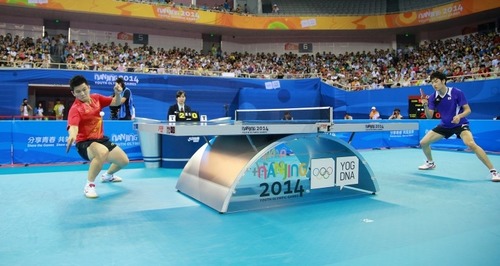
-
For generally aggressive players such as loopers, spinners, and power players, you have to make sure that you always generate the first attack, for failing to do so would make them utilize their power strength. You have to bear in mind that engaging with them in topspin rallies will always give them the winning edge. Force them into defence, where they are, for most cases, dull.
-
For generally defensive players such as blockers and choppers, patience is the key. Defensive players try to win points by breaking your playing rhythm, outbalancing you, or making you impatient. In either case, you need to vary your shots, ball placement, and chop pushes to prevent them from utterly controlling the ball movement. Increase frequency with slow and spiny loops to disorient blockers at times.
-
For penholders, apparently, it is their forehand that displays strength. The course of strategy to take is exploiting their backhand, although this is harder than it seems. Penholders, being in existence since the early days of table tennis, are already experienced into being drilled to their backhands too often thus already learning to adapt in this weakness; they exhibit excellent footwork to compensate. To make this strategy still work, you need to widen your ball trajectory. You have to do this in an arbitrary sense so your strategy won’t get figured out easily.
Conclusion
Preparing for a table tennis tournament can be a lot more tedious than it seems. It does not only involve practical preparations such as rigorous training, equipment preparation, and technical composition such as strategy devising against various types of opponents; it comes with trying to maintain mental stability during games. Make sure you conquer the internal battle within you first before you actually battle against other competing players.

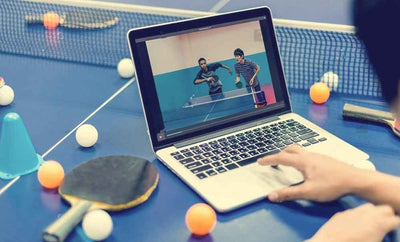
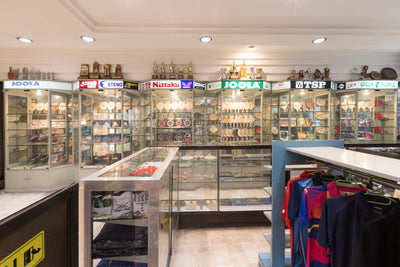

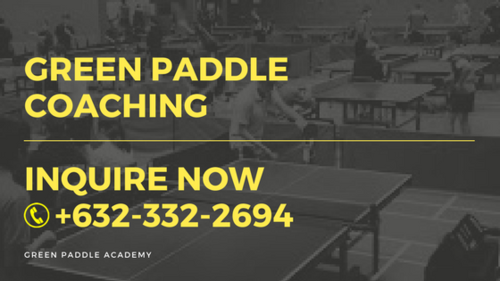
Comments
Leave a comment